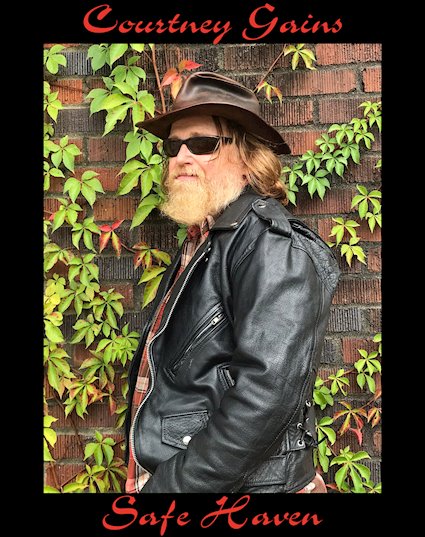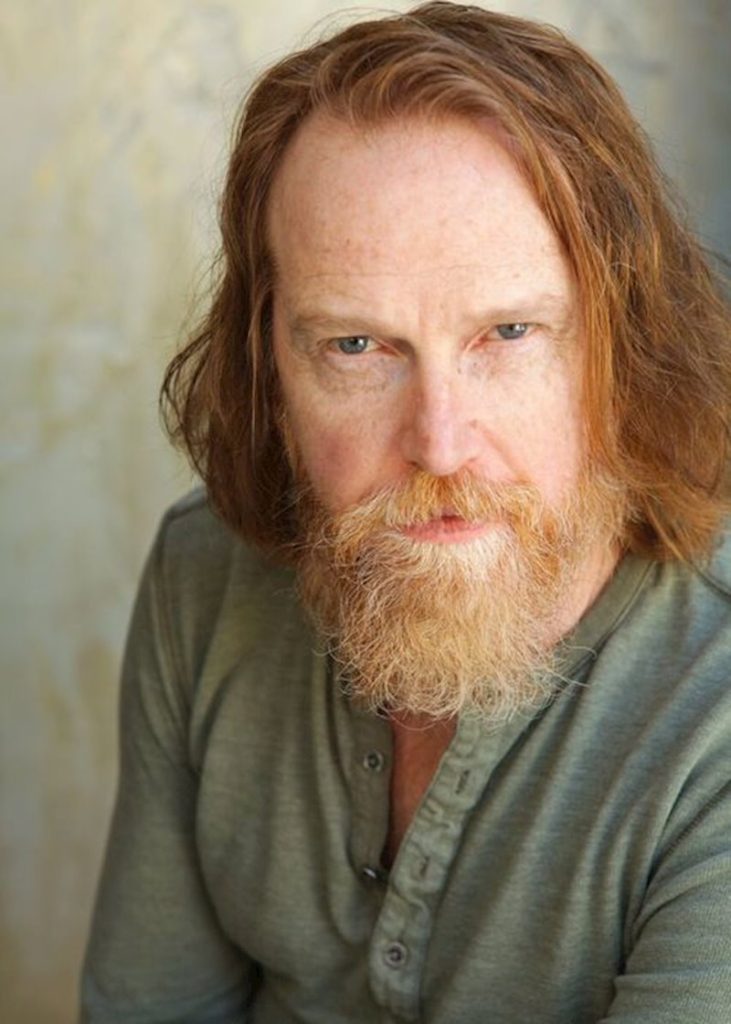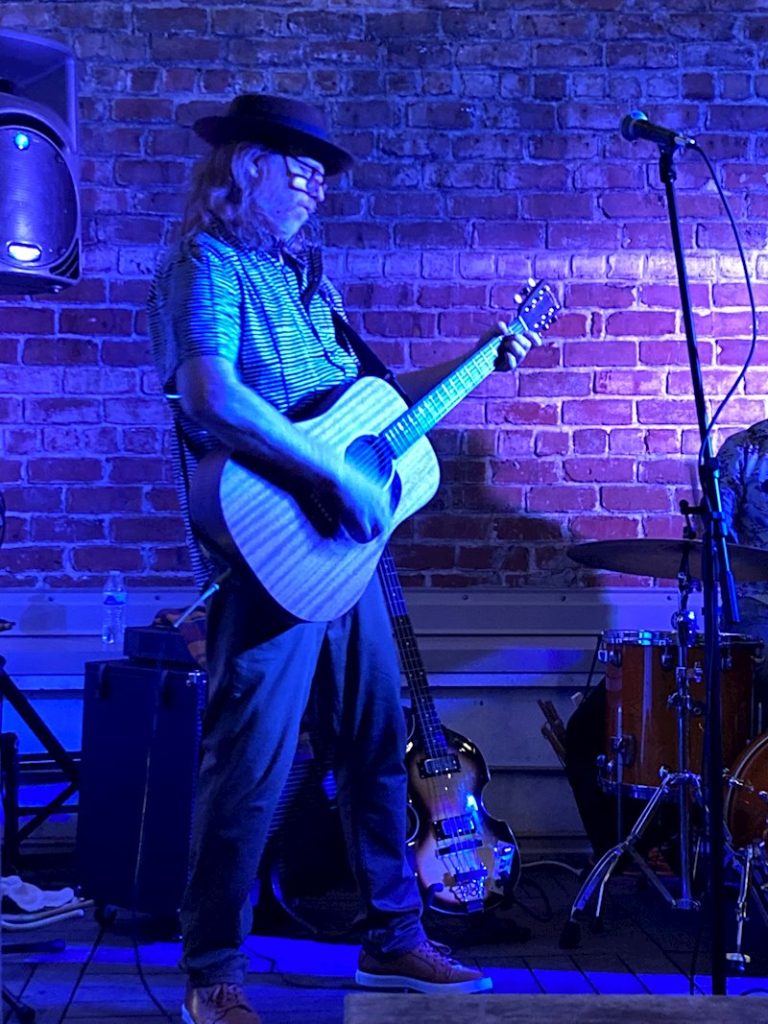COURTNEY GAINS, while clearly most known by horror fans as the dreaded enforcer Malachi in 1984’s groundbreaking Children Of The Corn, has been continuously active in film and TV for nearly four decades. Lesser known, but no less important to our subject, is his musical outlet. At times solo, at times as part of a band framework, COURTNEY GAINS now prepares to release his Safe Haven EP via Fake Fangs Records. Lord Randall takes a walk behind the rows…

TRUE BELIEVER
Interview with COURTNEY GAINS
Interview By: Lord Randall
Rebel Extravaganza: I have to start out by letting you know Children Of The Corn is my second favorite horror movie of all time, and definitely in the Top 10, no matter what genre.
COURTNEY GAINS: [Laughs] Wait? Your second one?! What’s the first?
RX: The Wicker Man from 1973 is my favorite movie of all time, the bonus is that it’s also horror, so…
CG: Good call, man.
RX: So how did you become involved in the film?
CG: Well, it was my first feature, and I’d been taking theatre classes since I was around 12, so even though that was my first paying feature gig, I’d had a few years of actual training. I knew maybe a little more of what was expected than a lot of people going into their first “main” role, at least as far as, like, lighting, set design, etc. Even though that obviously wasn’t what I was there to do, I knew what was happening when those guys were setting up, and it taught me a lot as far as my role as an actor related to all these other aspects of filmmaking.
RX: Were you a horror fan before the movie?
CG: I know it may sound strange to hear coming from me, but I’m not a huge horror fan. What sells me on a movie or a project is the story, and I felt like the original short story and the film were both good stories, first and foremost. It was a small town in Nebraska, and there weren’t cell phone towers or closed-circuit cameras everywhere – you felt like this could actually go down. And both of the stories get you believing in their world.
RX: And let’s not forget, in the story at least, Malachi Boardman’s end was ambiguous. In the film, he was very much a believer in what he felt was the purity of his mission and his role.
CG: In the film we see him get his neck snapped by Isaac but bringing him back would’ve been doable [Laughter], especially given the outlandish way other characters in other films and TV have shown back up back then and since. I’m not at all saying I’m bitter about that not being the case so far, but nobody’s ever approached me with a serious offer. [Laughter] If they want Malachi, they’re going to pay for Malachi. You know, John Franklin, Isaac in the original, co-wrote and starred in Children Of The Corn 666: Isaac’s Return back in ’99, and I feel like that would’ve been the prime moment to bring back Malachi, but it wasn’t meant to be, and I’m totally fine with that.
RX: I have to say, you’re recognizable if nothing else, so I was a little surprised to see you pop up in Colors a few years later.
CG: Yeah, Virgil Frye – Soleil Moon Frye’s father – had worked with Dennis Hopper in Easy Rider, so when he got cast in Colors, he said “Hey, you should bring on this guy.” They were looking for a white guy, and I’d grown up in LA around gangs and all, so he said, “He knows this stuff,” and I ended up in a Dennis Hopper movie, which is pretty cool. I mean, I got a beatdown, but…
RX: I always thought The ‘Burbs slipped a fair amount of darkness into what was marketed at first as a comedy, kind of like The Cable Guy. Working with Bruce Dern had to be a blast, but I have to ask about Brother Theodore.
CG: Oh, Larry Brezner, co-producer] was big on comedians, and had been familiar with Brother Theodore from the New York comedy clubs. I agree, definitely, it was a black comedy, which I guess fit with Brother Theodore. He was as eccentric as all the stories you read, but really personable. He’d invite us to play chess in his trailer, spot you a queen, then just destroy you.
RX: Let’s do the time warp now to Benny Bliss And The Disciples Of Greatness in 2009, which is kind of the genesis of Safe Haven.
CG: Exactly, yeah. Benny Bliss And The Disciples Of Greatness were a band in the movie, so there was obviously a ton of music, which is part of how Safe Haven came about. We kind of say it’s “The band that turned into a movie”, but we started playing live, and three songs from the film are on the EP. Martin Gugui, who plays Hairy Fingers, the keyboardist in The Disciples Of Greatness and one of the writers has played on a ton of records, including the first Billy Gibbons [ZZ TOP] solo album, so there’s a lot of pedigree just there. The movie ends in the desert with the band playing a 30- minute set, so we had to have our chops down, for sure, and we only really had one take to do that in! And it’s a music movie, so it was like “Okay, if we don’t pull this off, there is no movie!”
RX: And this year, you’ve got The Wrath Of Becky…
CG: …which is one of the better films I’ve done in a while. It’s a sequel to Becky, and it was a blast. I play Twig, a member of The Noble Men, obviously a Proud Boys reference, that kidnap Becky’s dog, and she comes to get him back, but by force. I got to play banjo, which was cool. I’d started growing my beard out during the pandemic because, well, not much else to do, not a lot of movies were being made because of the lockdowns. [Laughter] Turns out, grow a beard, the roles will come!
RX: In a very real way, the world of music and movies is the same as the sports world, in that a very small percentage of the people who are trying to “make it”, actually do. It’s got to be a good feeling that you’ve been active consistently for coming up on 40 years in the film and television industry.
CG: Oh, very much, and I know how blessed I am to be where I am today. Not in a conceited sort of way – or I hope it’s not taken that way – but I have worked for everything I have, which is a good feeling on its own. I’d studied in a pro acting workshop for years before Children Of The Corn, and I’ve never stopped studying. I was teaching up until a few years ago. You have to stay on top of your game, no matter what level you’re trying to reach. There are always new guys coming along, and you certainly can’t rely on your past to get you work. It’s simple, really; whoever rocks it gets the job.
I’ve never been afraid to practice, I guess that’s another thing that’s contributed to the longevity. The most humble thing I’ve ever heard about that was from Mikhail Baryshnikov, one of – if not the – greatest male ballet / classical dancer of all time. Somebody asked him what the hardest thing was about practicing, and he said “First position,” which is one of the most basic, first things you learn in dance. I’ve never forgotten that.
RX: Landscape changes, location changes are going to influence as well. The life of an actor is fairly nomadic, more so for a traveling musician. It’s important to find roots

CG: For sure. I’d lived in LA my whole life up until this recent move, and there’s sure a lot of traveling to shoots, locations, etc. There are a lot of movies filmed here, and California’s got such a variety of climates and landscapes that it can stand if for pretty much any location. But having said that, everything reminds me of something, good or bad. Even just driving down the street past the studios, thinking “Yeah, I got that job.”, “Didn’t get that role.”, you know? Down here in Georgia there’s absolutely zero of that. Not that I was ever one to get mobbed on the street by paparazzi or fans [Laughter], but I’m just a guy here, and I don’t have to deal with those trappings. It’s freeing.
RX: How has your work in film and TV translated into music, be it your work ethic or what have you?
CG: Well, when I started taking guitar lessons around age 13, I already knew my intention was to be a professional actor, so my focus was on that early on. I really worked at acting as a craft. Not to sound like I was some hyper-aware teenager, but even then – and I guess it had to do with being born and raised in LA – I realized that if I was going to do this for any length of time there was dedication that was necessary do succeed, and that there had to be passion if I was gonna enjoy it.
As far as music goes, my official lessons stopped after I’d learned the basic chords, or shortly after. I’ve kept at it, though, and it’s definitely a side of me that allow a freedom, in that whatever makes me passionate about it at the time is more important than adhering to any specific style or genre. I’ve been in bands, played solo…it’s a different world in LA than here in the Southeast, where I’ve been living for the past several years. In LA, you get a showcase, play a half-hour at a club, then go on about your merry way. Outside of that mass-produced world, though, you get a gig as a bar band, or band at a club, and you’re expected to play for 3 hours, 70% covers and a few originals thrown in the mix. It’s for sure a proving ground. Case in point, in the band I’m working with now, I’ve switched from guitar to bass, and we’ve been able to “weekend warrior” this project while getting ready for Safe Haven to come out, and hopefully get some tour action going down shortly.
We do a bunch of covers, but not in the way most people expect. We do a version of ‘Desperado’ by The Eagles that’s still a ballad, but it’s more up-tempo than theirs. Our ‘Should I Stay Or Should I Go’ by The Clash…I mean, how are you gonna match the original? You’re not. When we started working on it it just seemed like that bass lick was straight out of the ‘50s, so that’s where we took it.
RX: The first thing I’d heard of you doing anything musical was the Gains: Recordings From 1988-1999 that you put out in 2001.
CG: I’d been in a few projects, a band called Rooftop Boys. During the height of the Sunset Strip days for metal, I had a project called The Gathering, which was a coffeehouse band. I finally decided in ’01 just to put the thing out on my own, to get the songs out there. The song ‘Journeyman’ on there, my girlfriend and Matt Sorum’s girlfriend were best friends. When I’d put a band together for that recording, he called up Slash and asked if he wanted to come and jam on it. For whatever reason, he said sure, so I got the biggest bottle of Jack Daniels I could find and he came down and rocked the lead guitar on that one. It was so interesting watching how pros do it; the engineer was punching in stuff, and if you blew it you blew it, on to the next section, he’s going “We’ll punch it in later.”. I was seeing how records got made from the inside, and saw the differences and similarities between film & TV and music.
RX: Fast forwarding now to 2020, and you release Acoustic Gains Vol. 1.
CG: Well, the pandemic was in full swing, and I had a bunch of songs laying around, pretty much done, that I hadn’t tracked yet. Not to say anything good came out of the pandemic, but the one thing I think it showed everybody is that life is short, use the time you have on your hands for what you want to do. I put those 5 songs down, just something more introspective and personal, without the cost and pressure of being in a studio.

RX: And now here we are, Safe Haven, a full band, a deal with Fake Fangs.
CG: Yeah, and it’s nice to have a local label get behind me and the record, man. It’s a labor of love all around, and I can pick up the phone or shoot an email and know I’ll either get a voice on the other end or an email back super-quick. That’s an anti-LA mindset, so it’s perfect for what I’m doing now. We’re putting up a pre-order on the Bandcamp page where we’re doing 500 CDs, and if you get in on that early enough, I’ll personally autograph it to you. I mean, $8 for a CD, unlimited downloads if that’s your thing, and I’ll have some at live shows, of course.
RX: I got a real blues/roots rock vibe from the tunes myself. There were touches of everything from John Mellencamp to Neil Young, but there were blues licks all over the place.
CG: Oh, I’m a blues guy, man. “Three chords and the truth”, like [Bob] Dylan said. The Ripple Street album was all about a breakup, and I’ve been blessed to have the chance to articulate my emotions in song. I’ve processed a lot of things I’ve experienced, and (not to put down anything I’ve done musically), Safe Haven is the direct result of that looking inward…and outward. There’s a lot of fucked up things about the world today, and I have as much right to call it like I see it as anybody.
RX: And there’s a tour coming up, coinciding with the 40th anniversary of Children Of The Corn, so it really goes come full circle, huh?
CG: Exactly! We’re going to hit every place that’ll have us that’s logistically and financially doable. I’ll be traveling with a 35mm print of the film, and the plan – space allowing – is to show the movie, then do a short Q&A, then down to the business of rockin’ with the band. I’m learning by doing here, and I’m ready for the trial by fire!
Read the Rebel Extravaganza review of Safe Haven